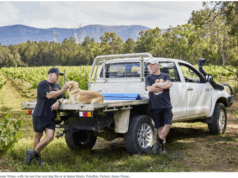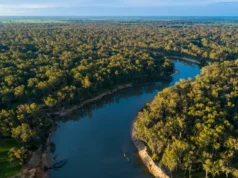What was the first piece of writing you had published?

Writer Ricky French
I was ten years old and it was a story about a hike I went on in New Zealand, where I grew up (so of course it was a tramp, not a hike). It was published in Wellington’s Dominion newspaper and was quoted a couple of years later by a historian in a very authoritative-sounding book about the mountain range.
It might sound glib, but something like that is hugely important at that age, when you’re defining who you are and what you’re good at. It led to a compulsion to write about about tramping; something I still suffer from. Incidentally, I met that historian just last year. He was selling his books at a flea market in a small town in New Zealand.
My first published piece as an adult was a eulogy for Grant McLennan of the Go-Betweens, published in the Melbourne music magazine Mess and Noise in 2006.
What’s the best part of your job?
That moment when the structure of a story I’ve been working on suddenly falls into place in my head. It usually happens while walking around the block. If I’m lucky, the penny will drop before I get to the footy field a couple of streets away, but if it doesn’t I just keep walking until it does. For me, if I know where my story starts and where it ends I can usually fill in the route pretty quickly, so often the first things I write in a new story are the first and last sentences.
What’s the worst part of your job?
Someone will love it and say I handled the topic sensitively, and then someone else will call me bottom-feeding scum.
Not appreciating enough what a great job it is. Self doubt. That horrible period of time between submitting a story and hearing back from your editor. The constant fear I’ll be exposed as an untrained jackass.
What’s been the most significant moment in your writing career so far?
Probably when the mother of dead boy whom I had written a story about in the Weekend Australian magazine wrote to the editor saying nice things about my story. I remember the intense pulse of emotion, like an electric shock in slow motion, flowing through my body when I read her words. For the first time I realised that things I wrote could actually bring comfort and happiness to people. That coin has two sides, of course, and it could have easily gone the other way. I think it was the first time I considered the old adage, ‘with great power comes great responsibility.’ I knew I didn’t have great power, but just enough power for my words to matter greatly.
What’s the best (or worst) advice you’ve received about writing?
I remember having a coffee with journalist Chris Johnston from the Age one day, and I was telling him how much I loved the freedom you get with long-form feature writing to be colourful or poetic or whimsical or funny or whatever it is you get a kick out of. Chris said that was all very well, but you still had to ‘report the shit out of it’.
He meant that you still had to drop all the facts, tick off the basics, get the important details right. Chris is a news reporter but also a fantastic long-form writer. I was never interested in news reporting, but Chris helped show me the indelible bond between the two.
The second piece of great advice wasn’t given to me, but it was a line from a book by New Zealand’s best feature writer, Steve Braunias. He wrote, ‘The best non-fiction reads like fiction’. It’s so true, and I think it’s something more writers and editors should embrace when writing and publishing creative non-fiction.
What’s the most surprising thing you’ve ever heard or read about yourself?
I’m always interested when I get polar opposite feedback about a story I’ve written. Someone will love it and say I handled the topic sensitively, and then someone else will call me bottom-feeding scum. Sometimes I think of a line by folk singer Jeffrey Lewis, who sings, ‘You get a good review and then you get a bad review, but don’t get suckered either way cause none of them know you’. If you’re honest with yourself and you have a reasonably level head, you’re probably doing an okay job, so just keep doing it.
There’s a big difference between wanting to be a writer and wanting to write.
If you weren’t writing, what do you think you’d be doing instead?
It doesn’t bear thinking about. I’d probably go back to forklift driving.
There’s much debate on whether creative writing can be taught – what’s your view?
I’ve never been inside a creative writing class, but I can’t see it doing any harm. When I was a kid, I had this cricket coaching video I used to watch obsessively. It was Richie Benaud talking about what it took to be a good captain. He said, ‘Captaincy is 10% skill and 90% luck. Don’t even think about attempting it without that 10%.’
I think you need a certain amount of natural talent, and like cricket, it probably helps to start when you’re young.
What’s your advice for someone wanting to be a writer?
I think someone who ‘wants to be a writer’ but has never written anything will struggle to be a good writer. There’s a big difference between wanting to be a writer and wanting to write. If you have a love of writing then you’ve probably already been doing it in some form. It you just love the idea of being a writer then I don’t think it’s a realistic career goal.
Do you buy your books online, in a physical bookshop, or both?
Both. I usually get book vouchers for my birthday, and find the decision-making challenge horrendous when faced with stacks and stacks of books. I can never relax in a book store. (Who wrote all these? Who published them? How? Why are there so many?) I’ll buy online if I already know the book I’m after.
If you could go out to dinner with any fictional character, who would it be and why?
I’ve always loved adventures and adventure stories, so I think dinner with Tom Sawyer would be pretty cool. It wouldn’t be a restaurant dinner, of course; more like frying sausages over a campfire. We’d cook up plans for a great expedition upstream, following creek beds and climbing waterfalls and traversing ridgelines in search of the ruins of a crashed aeroplane and the missing pilot. Then I’d write a stupid story about it.
What’s the book [or other example of writing] that’s had the most significant impact on your life or work – and why?
My uncle gave me a copy of Bill Bryson’s The Lost Continent when I was a teenager and it was monumental in driving my passion to write. I would basically just rip off his style, his sentence structure, his way of using big, serious words to make infantile jokes. I wasn’t writing for publication back then, but I would write 20-page letters to my cousin, then later I would write a ‘travel book’ about a trip around the South Island of New Zealand, which is now lost to the ages (no doubt for the best).
I still read everything Bryson writes, and consider him one of the masters, but it was the contagious joy and freedom of writing that exudes from the pages ofThe Lost Continent that still sticks with me. You can feel the smile of Bryson’s face as he writes, born of complete confidence in his own ability to write and be funny. It’s a place you always strive to go to, but I find it gets harder to travel there.


